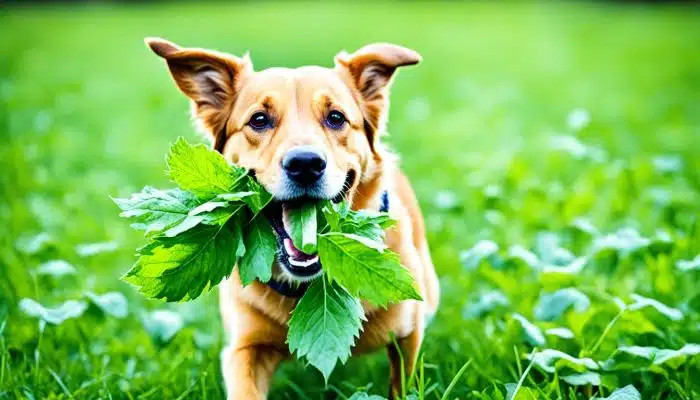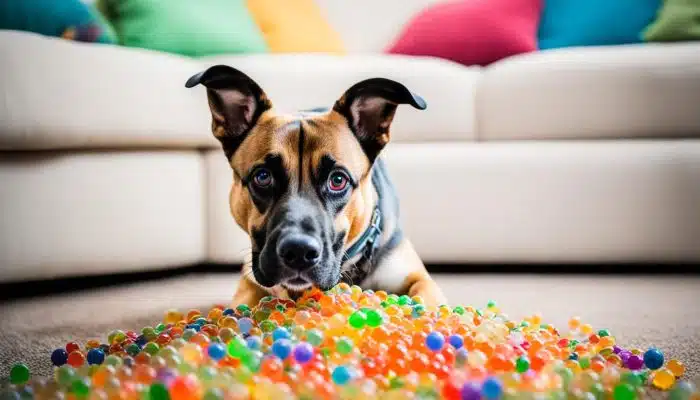
If you’re a proud owner of a golden retriever, you may wonder, “Is my golden retriever eating too much?” Overeating in dogs can lead to various health issues, including obesity, pancreatitis, and even cancer. As a responsible owner, it’s essential to monitor your pet’s eating habits and detect any signs of overeating before it’s too late.
In this section, I will help you understand the signs that indicate if your golden retriever is overeating. By the end of this article, you will gain insight into healthy eating habits and learn ways to manage your dog’s weight without compromising on their health and happiness.
Key Takeaways:
- Overeating in golden retrievers can lead to various health issues such as obesity, pancreatitis, and cancer.
- Monitoring your pet’s diet is essential to ensure they maintain a healthy weight.
- Identifying signs of overeating can help you take corrective measures before it’s too late.
- Establishing healthy eating habits is essential for your golden retriever’s overall well-being.
- Consulting with a veterinarian can offer personalized advice and help manage your dog’s weight effectively.
How much should a golden retriever eat?

As pet owners, it’s our responsibility to make sure our furry friends receive a balanced diet. Feeding your golden retriever too much or too little can lead to health problems. The amount of food your golden retriever should eat depends on a few factors, including their age, weight, and activity level.
A general guideline is to feed your adult golden retriever 2-3 cups of high-quality dry food per day, split between two meals. Puppies require more frequent feedings and should eat 3-4 times a day until they are 6 months old.
However, it’s always best to consult with your veterinarian to determine your golden retriever’s specific dietary needs. They may recommend adjusting the amount of food based on your dog’s individual requirements.
| Factors to Consider | Recommended Amount of Food |
|---|---|
| Age | Puppies should eat 3-4 times a day; adult dogs should eat 2 meals. |
| Weight | Average adult golden retrievers (55-65 pounds) should eat 2-3 cups of food per day. |
| Activity Level | More active dogs may require more calories and food. |
Remember, overfeeding your golden retriever can lead to weight gain and obesity, which can result in health problems such as joint issues, heart disease, and diabetes. It’s essential to monitor your dog’s weight and adjust their diet accordingly. A feeding guide can help you determine the right portion sizes for your furry friend and prevent overeating.
Recognizing Canine Obesity

If your golden retriever is overeating, they may be at risk of becoming overweight or obese. In this section, we’ll discuss the signs and symptoms of canine obesity so you can identify if your furry friend is at risk.
| Symptom | Description |
|---|---|
| Excessive weight gain | If your golden retriever is gaining weight rapidly or has gained weight despite maintaining their current diet, it might be an indication of obesity. |
| Difficulty moving | If your golden retriever is slower than usual, has difficulty jumping, or struggles to move around as they used to, it might be due to excess weight or obesity. |
| Difficulty breathing | Obese golden retrievers can experience breathing difficulties due to their excess weight, which can lead to severe health complications. |
| Reduced energy levels | If your golden retriever seems lethargic or less energetic than usual, it might be caused by obesity. Overweight dogs often have lower energy levels, which can affect their quality of life and happiness. |
Note: If you notice these symptoms or any other changes in your golden retriever’s behavior or appearance, it’s essential to consult with a veterinarian. They can help you determine if your dog is at risk of obesity and provide guidance on how to manage their weight.
Preventing and controlling canine obesity is crucial for your golden retriever’s health and well-being. In the next section, we’ll provide tips on promoting healthy eating habits and weight management.
Promoting healthy eating habits for dogs
Your golden retriever’s diet plays a significant role in maintaining their overall health and preventing obesity. Here are some tips and strategies for promoting healthy eating habits and managing your dog’s weight:
- Choose high-quality dog food that is rich in nutrients and low in fillers like grains and artificial preservatives. Read the ingredient list carefully and opt for products with whole meats, vegetables, and fruits.
- Establish a consistent feeding schedule and stick to it. Avoid free-feeding or leaving food out all day, as it can lead to overeating.
- Use portion control to ensure your golden retriever is receiving the appropriate amount of food. Measure out their meals with a measuring cup or weigh their food on a kitchen scale if necessary. Feeding charts and guidelines provided on dog food bags are just that — guidelines. You may need to adjust based on your dog’s activity level and weight management goals.
- Offer healthy treats like carrots, apples, or blueberries in moderation. Avoid giving your dog table scraps or human food, as it can cause digestive issues and lead to weight gain.
- Encourage exercise through activities like daily walks, games of fetch, and agility training. Regular exercise helps to burn off calories and reduce your golden retriever’s risk of becoming overweight.
Healthy meal examples
Here are some examples of healthy meals you can prepare for your golden retriever:
| Meal | Ingredients | Portion Size |
|---|---|---|
| Breakfast | 1/2 cup of high-quality kibble, scrambled egg, 1/4 cup of blueberries | 1.5 cups |
| Lunch | 1/2 cup of high-quality kibble, grilled chicken breast, green beans | 1.5 cups |
| Dinner | 1/2 cup of high-quality kibble, baked salmon, sweet potato, spinach | 1.5 cups |
“Helping your golden retriever maintain a healthy weight requires dedication and commitment, but the benefits are well worth it. By providing a well-balanced diet and encouraging exercise, you can help your furry friend live a long and happy life.”
Controlling your golden retriever’s food intake
If you suspect that your golden retriever is overeating, it’s important to monitor and control their food intake to maintain a healthy weight. Here are some strategies to prevent your furry friend from consuming excess calories:
- Establish a feeding schedule: Avoid leaving food out all day and instead, feed your golden retriever at set times of the day.
- Measure portions: Use a measuring cup to ensure you’re providing your pet with the recommended amount of food per meal.
- Limit treats: While treats can be a great reward for your furry friend, it’s important to limit how many they consume, as they can quickly add up in calories.
- Switch to low-calorie treats: If your golden retriever loves treats, consider switching to low-calorie options.
- Supervise their meals: Ensure you’re present during your pet’s mealtime and remove any uneaten food after 15-20 minutes to prevent overeating.
By following these strategies and paying attention to your golden retriever’s eating habits, you can make sure they are eating the appropriate amount of food to maintain a healthy weight. Remember to consult with your veterinarian if you have any concerns about your pet’s diet and weight management.
Conclusion
After reading this article, I hope you now have a better understanding of the signs that indicate whether your golden retriever is overeating and how to promote healthy eating habits for your furry friend. Remember to monitor your dog’s portion sizes, establish a balanced diet, and limit their food intake if needed to prevent overeating.
If you are still unsure whether your golden retriever is eating too much, don’t hesitate to consult with a veterinarian. They can provide personalized advice and recommend a suitable diet plan that meets your pet’s specific needs.
Overall, maintaining a healthy weight is essential for your golden retriever’s well-being. By keeping an eye on their eating habits and implementing healthy strategies, you can ensure they live a happy and healthy life.
Thank you for taking the time to read this article. If you have any questions or comments, feel free to reach out to me.
And always remember, a well-fed golden retriever is a happy golden retriever!
SEO relevant keywords: Is my golden retriever eating too much
FAQ
Is my golden retriever eating too much?
There are several signs that indicate if your golden retriever is overeating. These include excessive weight gain, constantly begging for food, emptying their food bowl quickly, and constantly searching for food. If you notice these signs, it’s important to monitor your pet’s diet and consult with a veterinarian if necessary.
How much should a golden retriever eat?
The appropriate amount of food for a golden retriever depends on various factors such as age, weight, activity level, and overall health. As a general guideline, adult golden retrievers usually require between 1.5 to 2.5 cups of high-quality dog food per day, divided into two meals. However, it’s crucial to consult with a veterinarian to determine the specific dietary needs of your furry friend.
What are the signs of canine obesity?
Canine obesity can lead to various health issues, so it’s important to recognize the symptoms. These may include excessive weight gain, difficulty exercising or breathing, decreased energy levels, and a lack of muscle definition. If you notice these signs in your golden retriever, it’s crucial to consult with a veterinarian for proper diagnosis and weight management strategies.
How can I promote healthy eating habits for my golden retriever?
Promoting healthy eating habits involves providing a balanced diet, controlling portion sizes, and avoiding excessive treats or table scraps. Opt for high-quality dog food that is appropriate for your golden retriever’s age and activity level. Additionally, establish regular feeding times and monitor their food intake to prevent overeating. Remember to consult with a veterinarian for personalized advice on your dog’s dietary needs.
How can I control my golden retriever’s food intake?
If you suspect your golden retriever is overeating, there are several strategies you can implement. These include using portion control and feeding your dog at set meal times rather than free-feeding. You can also provide mental and physical stimulation through interactive toys and regular exercise to divert their attention from food. If you’re unsure how to best manage your dog’s food intake, consult with a veterinarian for guidance.
What should I do if I am concerned about my golden retriever’s eating habits?
If you have concerns about your golden retriever’s eating habits, it’s always recommended to consult with a veterinarian. They can assess your dog’s overall health, provide tailored advice on portion control and diet management, and address any underlying health issues that may be contributing to the problem. Remember, professional guidance is essential for ensuring your golden retriever maintains a healthy weight and well-being.




